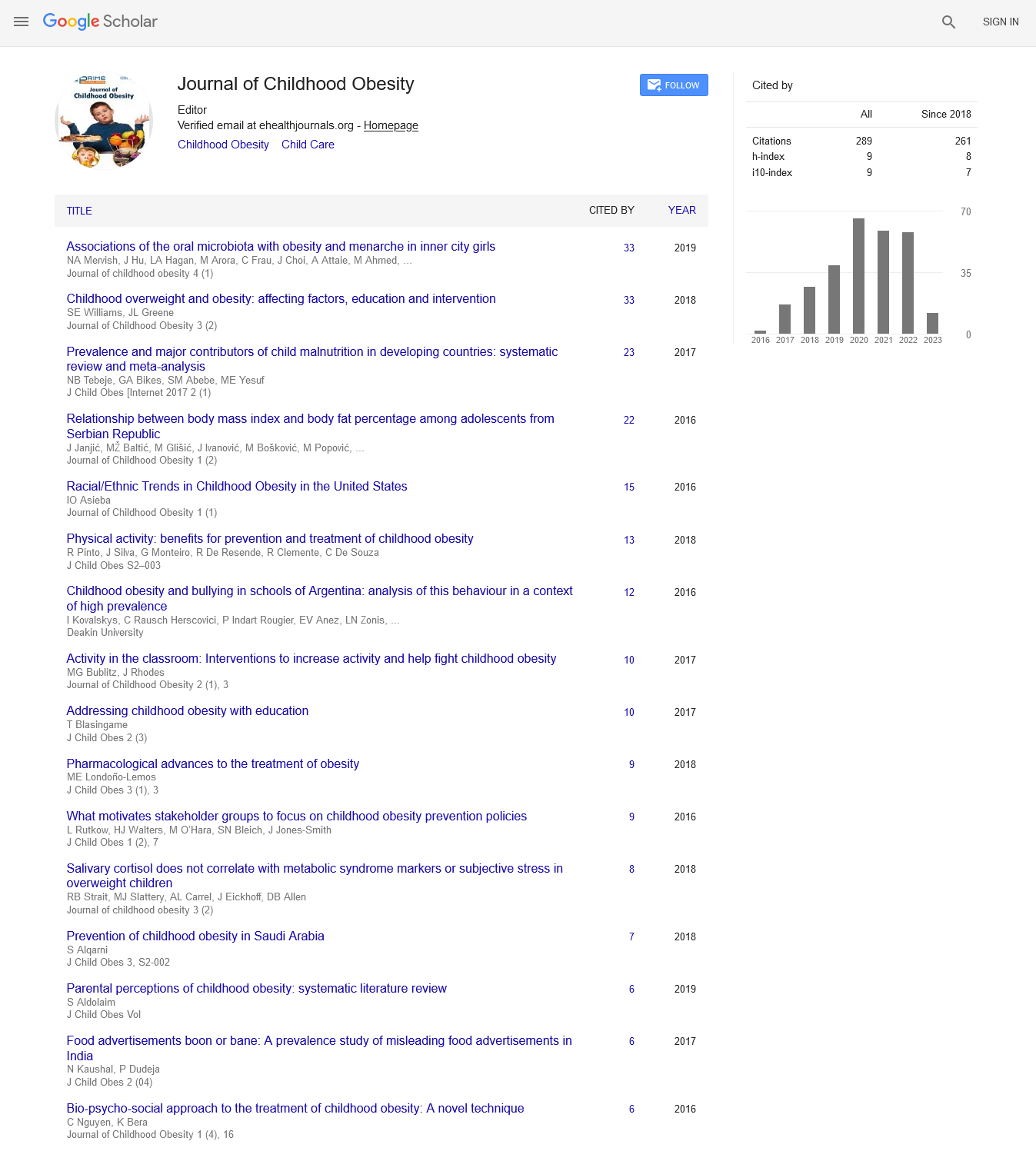Commentary - (2023) Volume 8, Issue 4
Hereditary Factors and Childhood Obesity Unraveling the Genetic Connection
Enrique Martinez*
Department of Nutrition, University of Washington, United States
*Correspondence:
Enrique Martinez,
Department of Nutrition, University of Washington,
United States,
Email:
Received: 01-Aug-2023, Manuscript No. ipjco-23-17787;
Editor assigned: 03-Aug-2023, Pre QC No. ipjco-23-17787 (PQ);
Reviewed: 17-Aug-2023, QC No. ipjco-23-17787;
Revised: 22-Aug-2023, Manuscript No. ipjco-23-17787 (R);
Published:
29-Aug-2023, DOI: 10.21767/2572-5394-23.8.40
Description
Childhood obesity is a complex and growing health concern that
affects millions of children worldwide. While environmental
factors such as diet and physical activity play a significant role
in this epidemic, genetics also play a crucial role in determining
a child’s susceptibility to obesity. In this article, we will explore
the hereditary factors that contribute to childhood obesity and
how understanding these genetic connections can help us address
this pressing issue. Childhood obesity is characterized by
the excessive accumulation of body fat in children and adolescents.
It is typically defined by a Body Mass Index (BMI) at or
above the 95th percentile for a child’s age and sex. The causes
of childhood obesity are multifaceted and include factors such
as diet, physical activity, and environment. However, genetics
also plays a significant role in predisposing some children to
this condition. Research has shown that obesity tends to run
in families, suggesting a strong genetic component. If one or
both parents are obese, a child is at an increased risk of developing
obesity as well. Studies have identified specific genetic
variations associated with obesity risk. Some children inherit
a slower metabolic rate, which means they burn calories at a
slower rate than others. This can make it easier for them to gain
weight when consuming the same amount of calories. Genetics
can influence how the body stores fat. Some individuals are genetically
predisposed to store excess fat around the abdomen,
which is associated with a higher risk of obesity-related health
issues. Genes also play a role in appetite regulation. Some children
may have genetic variations that affect their hunger and
satiety signals, making it challenging to control food intake. Genetics
can influence how a child responds to physical activity.
Some individuals may have a genetic predisposition to burn
fewer calories during exercise, making it more difficult to lose
weight through physical activity alone. Hormones like leptin
and ghrelin, which regulate appetite and metabolism, can be
influenced by genetics. Variations in these hormones can impact
a child’s appetite and energy balance. It’s important to
note that while genetics plays a significant role in childhood
obesity, it interacts with environmental factors in a complex
manner. Environmental factors such as access to healthy foods,
opportunities for physical activity, and family eating habits can
either exacerbate or mitigate the genetic predisposition to
obesity. For example, a child with a genetic predisposition to
obesity may be more susceptible to weight gain if they live in
an environment with easy access to high-calorie, low-nutrient
foods and limited opportunities for physical activity. Conversely,
a child with the same genetic predisposition may be less likely
to become obese if they grow up in an environment that promotes
healthy eating and active lifestyles. While genetics can
increase the risk of childhood obesity, it does not determine
a child’s destiny. Prevention and management strategies can
help mitigate the genetic risk and promote healthier outcomes
identifying and addressing obesity risk factors early in a child’s
life can be crucial. Pediatricians can assess a child’s growth and
development and provide guidance on nutrition and physical
activity. Encouraging a healthy lifestyle that includes a balanced
diet and regular physical activity is essential for all children, regardless
of their genetic predisposition. Parents can serve as
role models by adopting healthy habits themselves. In some
cases, genetic counseling can be beneficial for families with a
strong history of obesity.
Acknowledgement
None.
Conflict Of Interest
The author declares there is no conflict of interest in publishing
this article.
Citation: Martinez E (2023) Hereditary Factors and Childhood Obesity Unraveling the Genetic Connection. J Child Obesity. 8:40.
Copyright: © 2023 Martinez E. This is an open-access article distributed under the terms of the Creative Commons Attribution License, which permits unrestricted use, distribution, and reproduction in any medium, provided the original author and source are credited.

